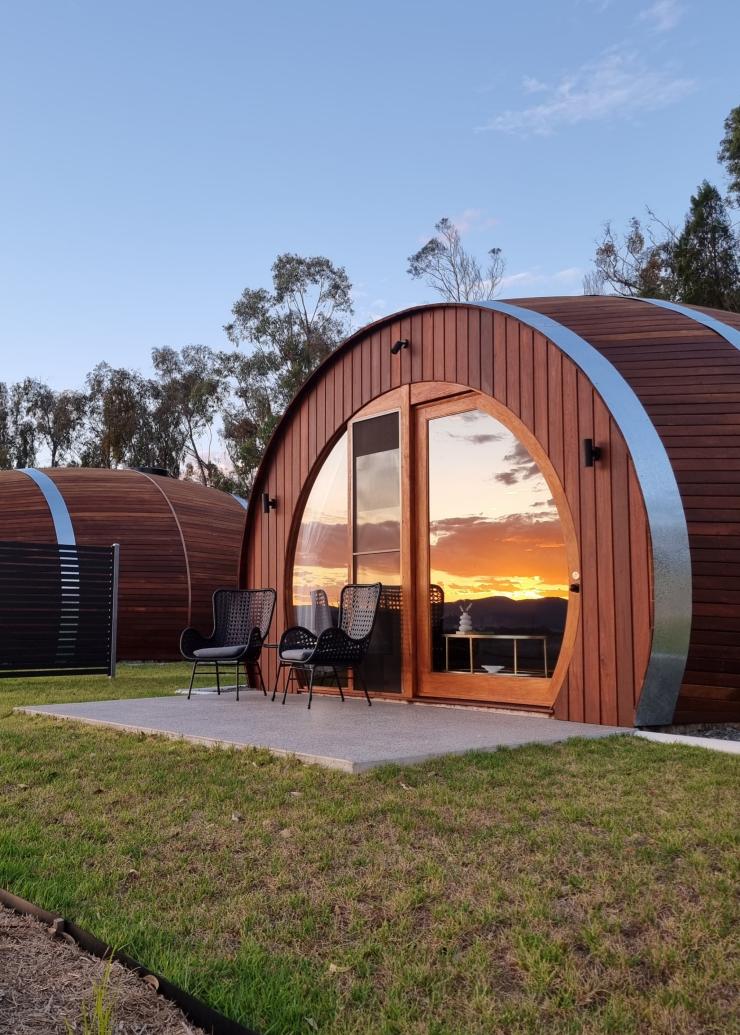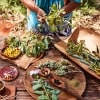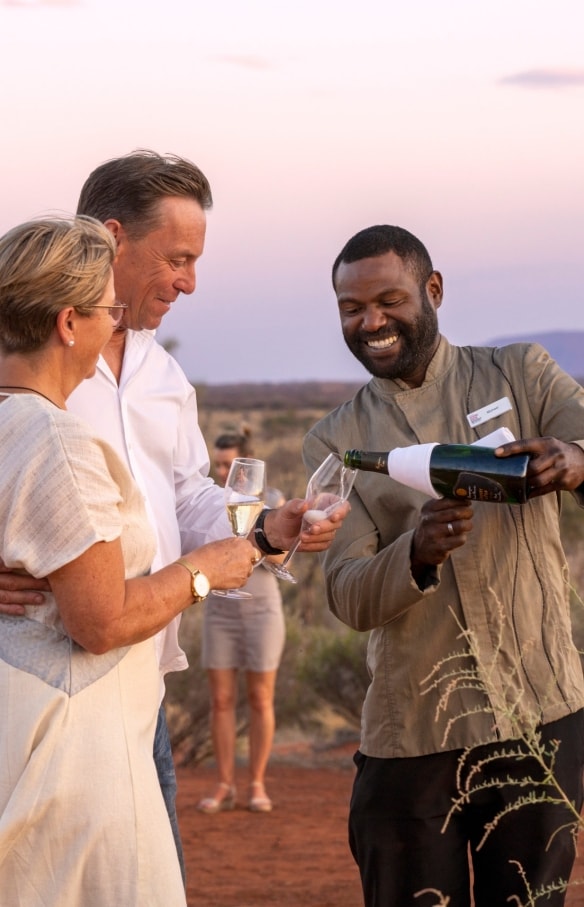
Sydney Oyster Farm Tours, Mooney Mooney, New South Wales © Tourism Australia
Australia’s most unique culinary experiences
Crack open fresh oysters, hunt down seasonal ingredients and enjoy dining with unbelievable views – Australia will surprise even the most discerning foodie.
1
Sleep beside the vines
1
Sleep beside the vines
Why you’ll love it: Waking up to vineyard views – and maybe a kangaroo or two
Australia’s vineyards are older than you might expect. In fact, Australia has some of the world’s oldest shiraz and grenache vines. Australia’s winery stays bring you fully into the world of Aussie wine, offering tasting experiences, on-site restaurants and nights spent among the sounds of nature. From tiny houses nestled among the vines to luxury homesteads, Australia’s winery accommodation is not to be missed.
2
Shuck your own oysters
2
Shuck your own oysters
Why you’ll love it: Biting into oysters as fresh as they come
Australia boasts some of the world’s best seafood, and oysters are certainly near the top of the list. On an oyster tour, the oysters don’t come to you – you go to the oysters. Pull on a pair of rubber waders and step out into calm waters, where oysters are waiting to be plucked from their leases and shucked fresh.
3
Taste flavours you’ve never imagined
3
Taste flavours you’ve never imagined
Why you’ll love it: Discovering ingredients that grow only in Australia
Have you ever tasted finger lime? How about a witchetty grub? Australia is full of adventurous flavours you’ve never imagined. Broaden your culinary mind when you spear for mud crabs with an Aboriginal guide, collect bush tucker in the outback or sit down to fine dining dishes that make use of Australia’s native bounty.
4
Forage for prized truffles
4
Forage for prized truffles
Why you’ll love it: Following the expert noses of truffle-hunting dogs
Truffles, a savoury mushroom so rich they’re described as “black gold,” are hidden underground in several destinations across Australia. On a truffle tour (available during Australia’s winter from June to August), you’ll enlist the help of the cutest canine guides as they sniff out this delicious ingredient. After you’ve gathered your harvest, taste truffle-infused dishes that will have your mouth watering.
5
Picnic on a white sand cay
5
Picnic on a white sand cay
Why you’ll love it: Leaving footprints in white sand on a completely private cay
Australia has no shortage of picturesque picnic spots, but a white-sand cay on the Great Barrier Reef has to be one of the most beautiful. You’ll board a helicopter to see the magnificence of the reef from above before landing on a strip of sand that you and your crew will have all to yourselves.
6
Dine under a million outback stars
6
Dine under a million outback stars
Why you’ll love it: Indulging in delicious food as the sun sets behind Uluru
The iconic red sand, the mighty monolith of Uluru and Aboriginal cultures that span tens of thousands of years – Australia’s Red Centre is certainly a spiritual place. You’ll feel the energy of the outback as you sit down to a meal that utilises unique desert ingredients. As the sun sets, a blanket of stars will appear over your head.
7
Take a helicopter to the pub
7
Take a helicopter to the pub
Why you’ll love it: Joining in the Aussie love of the pub
It’s no secret that Australians love going to the pub. There’s great food, local beer and a casual atmosphere perfect for catching up with mates. Take the Aussie pub to whole new heights on a helicopter pub crawl. Amazing aerial views, cold drinks and a few colourful locals are guaranteed.
8
Enjoy fine dining on a sparkling harbour
8
Enjoy fine dining on a sparkling harbour
Why you’ll love it: Dining with views of the iconic Sydney Opera House
Australia’s food is delicious on its own, but the views make it taste even better. With its shimmering harbour, Sydney is one of the best places to eat with a backdrop to impress. Enjoy a lunch beachside, indulge at a fine dining restaurant and even make a reservation at a restaurant inside the sails of the Sydney Opera House.
9
Order an epic cocktail on a rooftop
9
Order an epic cocktail on a rooftop
Why you’ll love it: Sipping expertly-made cocktails while the sun sets
When the sun is shining, Aussies flock to the rooftops. Australia’s rooftop bars offer extensive cocktail menus, great food and all-around good vibes. Plus, the views over the city below are especially magical at sunset. Browse from a list of cocktails ranging from classic to almost too pretty to drink.
10
Make dining the destination
10
Make dining the destination
Why you’ll love it: Digging into a dish next to the garden it was sourced from
Some of Australia’s top chefs have set up shop not in the bustling city, but in peaceful regional destinations that offer delicious produce and a slower pace. These regional restaurants make use of local ingredients, working with what nature offers with each new season. The result? A menu of food so thoughtful, you’ll be thinking of it long after your plate is clean.
11
Try seafood as fresh as can be
11
Try seafood as fresh as can be
Why you’ll love it: Watching eagerly as your guide dives for ocean-fresh abalone
As an island nation, Australia is spoiled with an abundant and sustainable seafood industry. You’ll find seaside restaurants serving up the daily catch and fish markets with rows of oysters and prawns. If you want to immerse yourself even further, join a tour that takes you out into the water to taste the delights of the sea right as they’re caught.
12
Bottle your own bespoke spirit
12
Bottle your own bespoke spirit
Why you’ll love it: Crafting a bottle of spirits completely unique to you
From the well-established whiskey in Tasmania to the craft gin boom in Sydney, Australia has serious distilling chops. The Aussie spirit of innovation plays a huge part in creating new and exciting spirits, like gin infused with native green ants. Get in on the creativity by bottling your own bespoke spirit. What better souvenir to take home?






















































































































































































